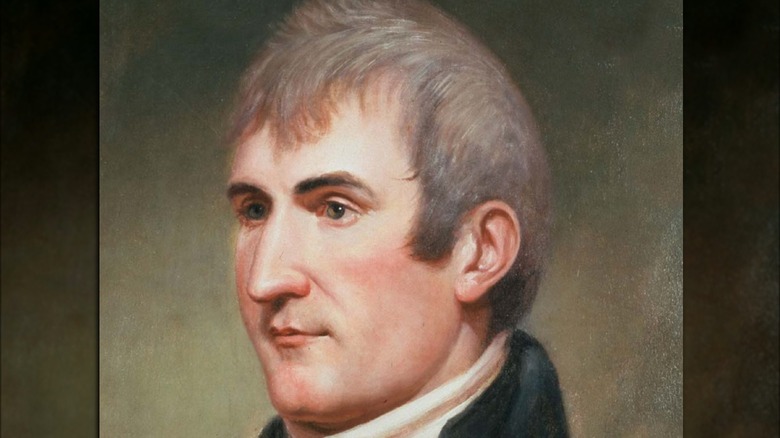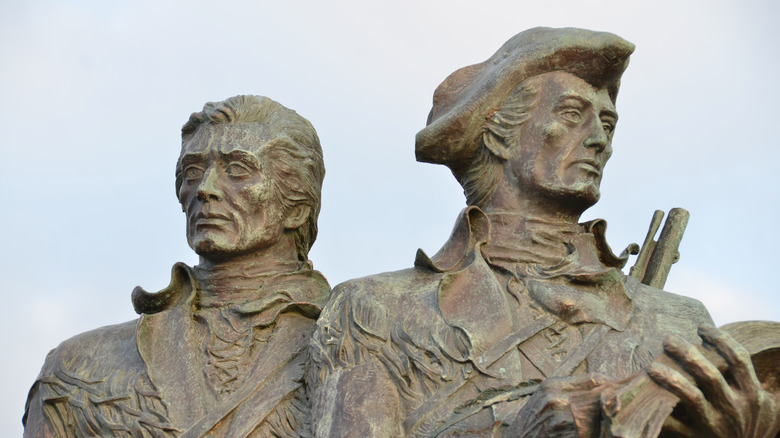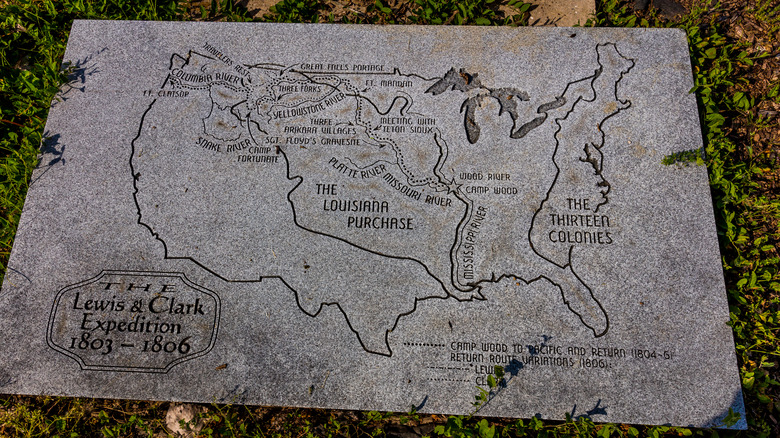The Truth About Lewis' Time As Thomas Jefferson's Secretary
Meriwether Lewis is most known for the Corps of Discovery expedition he headed together with William Clark. Before that, however, he was a captain in the Army and was requested by President Thomas Jefferson to be his private secretary in 1801. Jefferson wrote a letter to the commander of the U.S. Army, seeking Lewis and giving his reasons for choosing him to be his secretary, which included his knowledge of the Western country as well as his "personal acquaintance" with him (via National Archives).
Lewis and Jefferson, indeed, had a history as they lived in the same neighborhood in Virginia. Members of Lewis' family were friends with Thomas Jefferson and in fact, two of the president's siblings were married to Lewis' family members, per Monticello. Upon learning of Jefferson's intentions, Meriwether Lewis immediately sent back a correspondence to accept the post, saying that by doing so, he could still serve his country despite being discharged from his duties in the Army. With his experience in the Army, one of Lewis' first tasks as Jefferson's private secretary was to go through a list of officers to determine which ones were competent and which ones weren't. He also reported to the president regarding the officers' political inclinations.
Meriwether Lewis leads an expedition
Two years after being appointed by Thomas Jefferson as his personal secretary, Meriwether Lewis was offered to lead an "exploring party" of the Louisiana Purchase, which is now known as the Lewis and Clark Expedition. According to Monticello, the president chose Lewis to lead the party for his extensive experience in the army as well as his experience as a frontiersman. Despite his vast knowledge and abilities, though, he still needed to acquire more skills to aid him in the expedition. In 1803, Lewis studied under great scientific minds of the time including Caspar Wistar, Andrew Ellicott, Benjamin Rush, and Benjamin Smith Barton, among others, to gain more knowledge. He studied botany, surveying and map making, medicine, anatomy, and fossils.
Meriwether Lewis requested William Clark to join him in the expedition. The two had worked together prior to Lewis' time in the army, and he chose Clark to go with him for his excellent abilities as a frontiersman and draftsman, per the National Archives. Lewis believed in Clark's abilities so much that he appointed him as the co-captain of the expedition party. The Corps of Discovery expedition began in 1804 and ended in 1806.
Lewis' life after the expedition
After the successful exploration, Meriwether Lewis came back to Washington to a warm welcome. He was paid a salary and was given 1,600 acres of land for his efforts. He never went back to serve as Thomas Jefferson's private secretary, but instead, he was appointed Louisiana Territory's governor in 1808. Lewis was a good expedition leader, but the same cannot be said for his political post. He made enemies in the government and was even accused of mishandling government funds (via State Historical Society of North Dakota). While this was happening, he was also being pressured to complete his expedition journals for publishing. The stress of the controversies surrounding him led Lewis to turn to alcohol.
Meriwether Lewis was on his way to Washington, D.C., from Louisiana when he died in 1809. His body, which had gunshot wounds, was found at an inn. Those close to him believed Lewis killed himself, while others say that he was murdered, as reported by Smithsonian Magazine. History professor Paul Douglas Newman described Lewis' last days by saying, "At the end of his life he was a horrible drunk, terribly depressed, who could never even finish his journals." To this day, the circumstances surrounding Meriwether Lewis' death remain a mystery.


